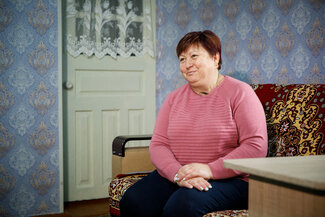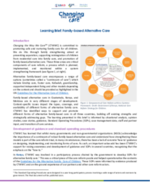
Background Information
In 2017, Ms. Domnica Coilieva found her calling as a foster parent. She was drawn to the profession after attending a workshop held by the local government seeking potential foster parents. Her neighbor was also a foster parent and shared her positive experience. Finally, she went to her daughter and son and asked their opinion. “It’s up to you to decide…If you’re willing – why not?,” exclaimed her daughter. It was the permission that Domnica was seeking, she met with the social worker for her city and signed up.
Six years later, over 13 children have found warmth, comfort, and love in her home. “It started as something temporary. Kids can be brought for seven to 10 days, for instance,” explains Domnica. “Afterwards, a solution is found. They are either given back to their parents or relatives or adopted by a family. Sometimes they stay for six to seven months or even three years....” The transitioning of children in and out of her home is sometimes difficult for her. “When the children leave, I go out and cry so they would not see my stress and my feelings. The kids should be happy here. They shouldn’t see me sad or angry.” Domnica tries to maintain a relationship with the children after they leave. “They send me pictures. The kids always remember how they ate or cooked and how they did stuff. They remember it all the time, even now… Some children were adopted 4 years ago, and they still keep asking: ‘When are we visiting Aunt Dusea? Are we going today? How about on holidays? And I say: ‘Come!’.” Though residential institutions were prevalent when Dominca was a child, she strongly believes that children do better when they grow-up in family-type environments. “...they don’t get such care in a children’s home. There are many children and not all of them can get the attention they need.”
Ms. Valentina Dimitrieva, a social worker in Domnica’s home city of Taraclia, has the highest respect for her and her work as a foster parent. She recently turned to Domnica to support a child with a physical disability who was transitioning out of a residential institution, where he spent most of his young life. “We came in touch with Domnica, who agreed to take the child,” explains Valentina. “She accepted him without any doubts or uneasiness. At the moment, the child is getting all he needs – warmth, care and comfort.” Domnica was at first nervous to take in a child with a disability. As usual, she consulted with her children. Ultimately, she decided she had room in her house and her heart for the child. When she speaks of him, it is filled with pride, “He likes to listen to music all the time. Or news. He sort of likes politics.” She is also very protective of him. “I wouldn’t want to send him back to the children’s home because…from what he says ‘They bully me…call me names.’ Well, in our home, no one ever hurts him or calls him this or that.” During the week, Domnica takes the long walk with him to the nearby school. She pushes his manual wheelchair as the roads are too uneven for him to use his power wheelchair. They talk along the way. He loves to reach over and feel the wildflowers on his hand. It is a ritual that they both look forward to.
Domnica wants people to know that being a foster parent is a challenging profession. “We stay awake at night when they’re sick. We have to be by their side all the time. Some kids are little and others are big. There are challenges with both. You need to have an approach to everybody.” But, it is also rewarding. “All the children [that I have cared for] feel they’re part of the family, always. That’s how all the children feel in every foster family that we have here.”
Where They Operate
Key Areas of Work
Languages Spoken
Practitioner Resources
This learning brief was developed as part of Changing the Way We Care's 2022 annual report and shares learning on family-based alternative care from Guatemala, Moldova, India and Kenya and links the reader to additional CTWWC resources on the topic.

